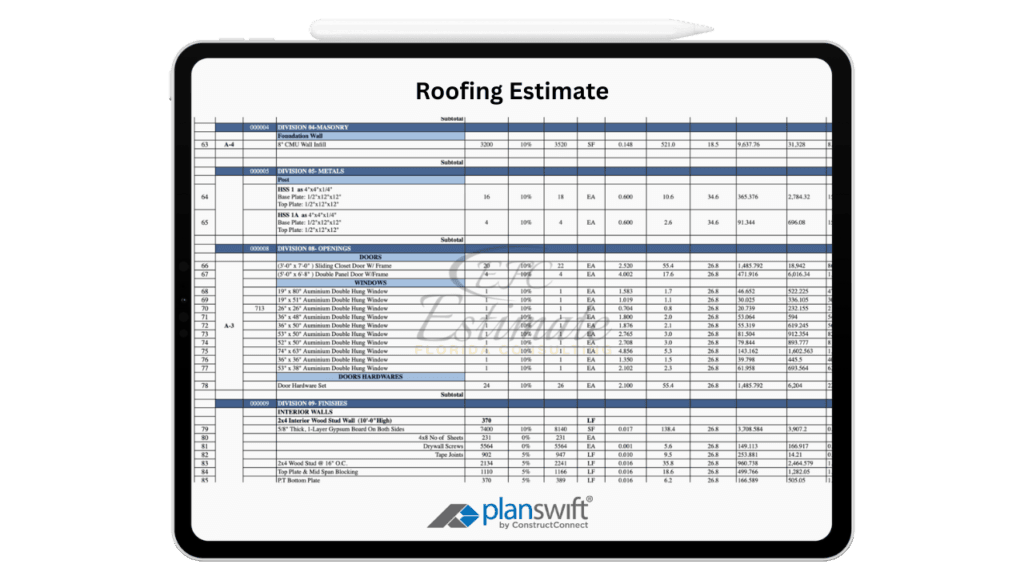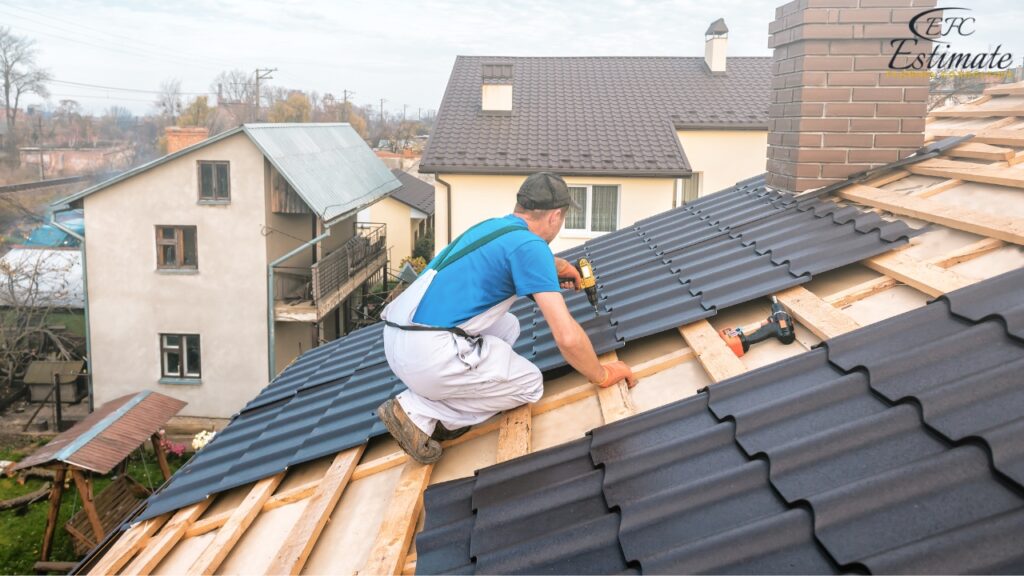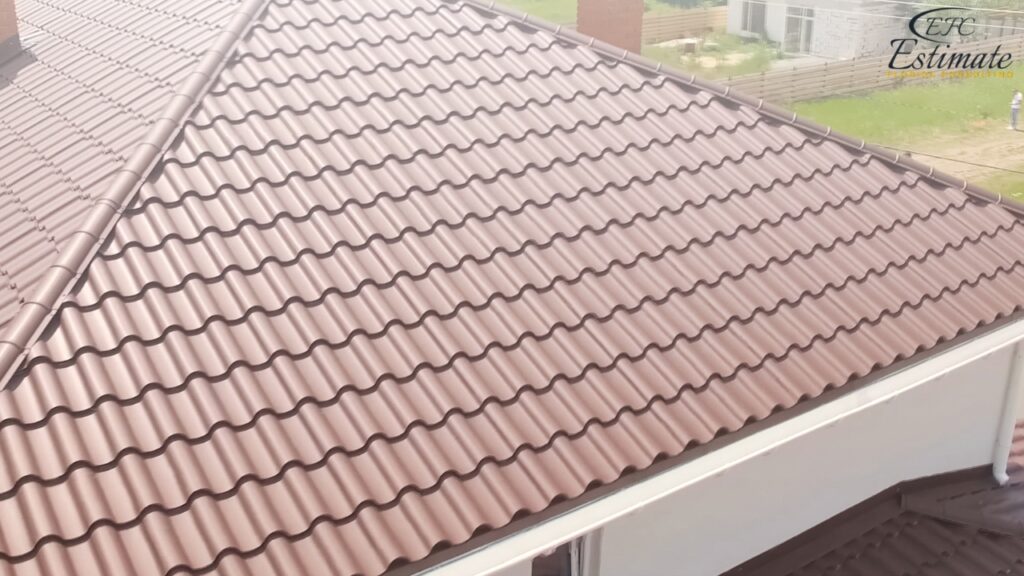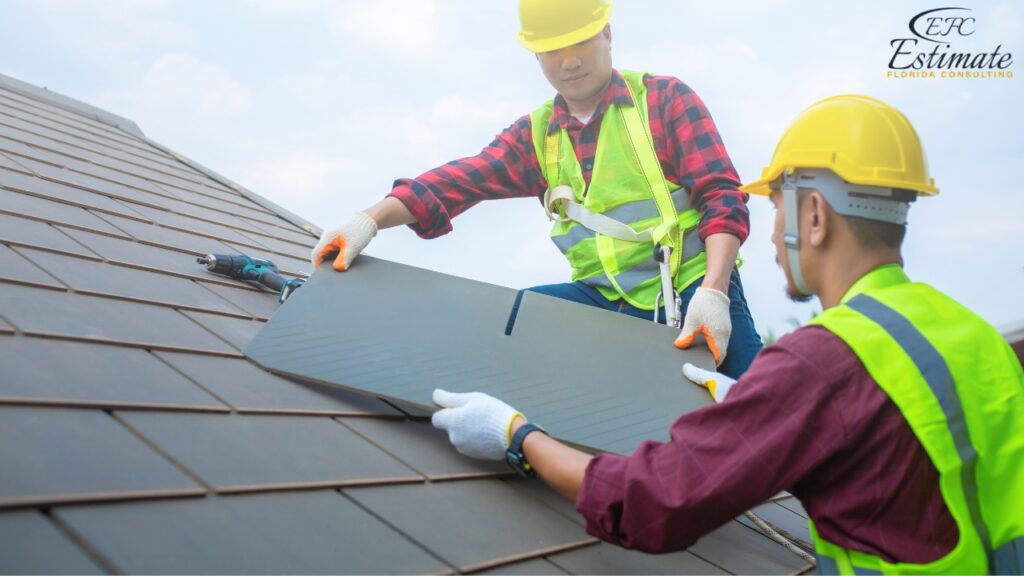90% More Chances to Win Projects With Our Estimate!
- Multi-Family Building
- Hotel Building
- Hospital Building
- Warehouse Building
- School & University Building
- High-Rise Building
- Shopping Complex
- Data Center Building

Tile roofing consists of individual tiles made from several materials, including clay, concrete, and slate. This roofing style has gained popularity over centuries due to its timeless beauty and remarkable durability. In addition to enhancing a home’s aesthetic, tile roofs provide excellent insulation, contributing to lower energy bills. Furthermore, tile roofs are fire and pest-resistant, making them a practical choice for homeowners looking for a reliable and attractive roofing option.

The cost of installing tile roofing can vary depending on several factors, including the type of tile chosen and the complexity of the roof design. Generally, homeowners can expect to pay anywhere from $13 to $26 per square foot for a complete tile roofing installation. The final cost depends on the type of tile material used, the size of the roof, and the labor rates in your area. Keep in mind that while tile roofing may have a higher upfront cost compared to asphalt shingles, the long-term benefits of durability and low maintenance often offset this initial expense. Over time, the reduced need for repairs and the added value to the home make tile roofing a financially wise decision.
Type of Tile Roofing | Average Cost per Square Foot |
Clay Tiles | $13 – $20 |
Concrete Tiles | $10 – $16 |
Slate Tiles | $20 – $33 |
There are several types of tile materials available, each with its own distinct advantages and cost implications. Understanding the differences between clay, concrete, and slate tiles can help homeowners choose the best option for their specific needs and budgets.
Clay tiles are one of the oldest and most popular roofing materials, known for their classic Mediterranean or Spanish style appearance. Clay tiles are crafted from natural clay that is shaped and baked at high temperatures to create a hard, durable material. The unique color and texture of clay tiles offer a distinct aesthetic appeal that can enhance the architectural style of a home. The cost of installing clay tiles generally ranges from $13 to $20 per square foot, depending on the size of the roof and the specific type of clay tile used. While clay tiles are slightly more expensive than some other materials, their durability, energy efficiency, and natural beauty make them a popular choice for homeowners seeking a timeless look for their home.
Concrete tiles provide a durable and cost-effective alternative to clay tiles, making them a popular choice for homeowners looking for a balance between aesthetics and affordability. These tiles are made from a mixture of cement, sand, and water, which is molded into shape and allowed to harden. Concrete tiles are often manufactured to resemble clay or slate tiles, offering homeowners a wide variety of design options at a lower cost. The average installation cost for concrete tile roofing ranges from $10 to $16 per square foot, making it one of the more affordable tile roofing materials. Despite their lower cost, concrete tiles are still highly durable and can last for decades with proper maintenance.
Slate tiles are considered a premium roofing material due to their natural beauty, exceptional durability, and high-end appearance. Made from natural stone, slate tiles are one of the most durable roofing materials available, often lasting more than 100 years with proper care. The cost of slate tile roofing installation typically falls between $20 to $33 per square foot, making it the most expensive option among tile roofing materials. However, the long lifespan and stunning appearance of slate tiles make them an excellent investment for homeowners looking to add significant value to their property. Additionally, slate tiles are incredibly fire-resistant and impervious to insects, rot, and mildew, making them a practical choice for long-term performance.
Several factors can influence the overall cost of a tile roofing project. From the quality of materials used to the complexity of the installation process, understanding these elements can help homeowners estimate their roofing budget more accurately.
The quality of the tile material selected will have a significant impact on the total cost of the roofing project. High-end materials, such as premium-grade clay or slate tiles, tend to have a higher initial cost but offer superior durability and aesthetic appeal. Choosing high-quality materials may result in a larger upfront investment, but these materials are less likely to need repairs or replacement over time, which can save money in the long run. Additionally, high-quality materials often come with extended warranties, providing homeowners with added peace of mind.
The size and complexity of the roof play a major role in determining the total cost of the project. Larger roofs naturally require more tiles and take longer to install, which increases both material and labor costs. Additionally, roofs with intricate designs, steep slopes, or multiple levels may require specialized installation techniques, further increasing labor expenses. For example, a roof with multiple gables, valleys, or skylights will require more precise cutting and fitting of tiles, which can add time and labor costs to the project. Homeowners should also consider accessibility factors, as roofs that are difficult to reach may require scaffolding or special equipment, further increasing labor costs.
Labor costs for tile roofing installation can vary based on the complexity of the project and the location of the home. On average, labor costs account for 40% to 60% of the total project cost, depending on the region and the expertise of the roofing contractor. Homes located in areas with a higher cost of living tend to have higher labor rates, which can significantly impact the overall cost of the roofing project. Furthermore, tile roofing requires specialized skills and precision, making it essential to hire a contractor with experience in working with this material. Homeowners should obtain multiple quotes from reputable contractors to ensure they are getting a fair price for the labor involved.
The location of the home can also impact the cost of tile roofing installation. For instance, homes in areas prone to hurricanes, heavy snow, or extreme heat may require additional reinforcements to ensure the roof’s durability. This can increase both material and labor costs, as well as the need for specialized installation techniques. Additionally, the availability of materials may vary depending on the region, with some areas having easier access to certain types of tiles, which can influence the overall price. Homeowners in remote areas may also face higher transportation costs for materials, adding to the total project cost.

The total cost of tile roofing installation consists of several components, each contributing to the overall expense of the project. Understanding these cost factors will allow homeowners to plan their budgets more accurately.
Component | Cost Breakdown (Per Square Foot) |
Tile Roofing Material | $13 – $33 |
Labor | $5 – $10 |
Underlayment and Waterproofing | $2 – $4 |
Removal and Disposal of Old Roof | $1 – $3 |
Additional Structural Support | Varies by Project |
Labor is another significant factor in the overall cost of tile roofing installation. The complexity of the roof, the type of tiles used, and the experience of the roofing contractor all play a role in determining labor costs. On average, labor for installing tile roofs ranges between $5 to $10 per square foot. This estimate can increase for roofs with intricate designs, steeper pitches, or additional structural modifications, as these conditions require more time and skill to complete. Furthermore, some tile materials, like slate, require specialized installation knowledge, which can increase labor costs even further. It’s essential to hire experienced contractors familiar with tile roofing installation to ensure a high-quality job that stands the test of time.
Underlayment is a critical component in tile roofing installations, providing an additional waterproof barrier between the tiles and the roof deck. The cost of underlayment and waterproofing materials typically adds $2 to $4 per square foot to the overall cost of a tile roof installation. The type of underlayment used will depend on the climate and weather conditions in the area. In regions with heavy rainfall, a more robust underlayment system may be required to prevent leaks and water damage. The installation process for underlayment can also impact labor costs, as it must be properly aligned and secured to ensure the roof’s long-term integrity.
If you are replacing an existing roof with tile, the cost to remove and dispose of the old roofing material will be an additional expense to consider. The removal process requires careful handling, especially when dealing with hazardous materials like asbestos or certain types of underlayment. On average, removing and disposing of old roofing materials can add $1 to $3 per square foot to the project’s total cost. Depending on the complexity of the removal, this cost could be higher, particularly if the old roof consists of multiple layers of shingles or has underlying structural damage. Proper disposal of materials is also essential for environmental compliance, and reputable contractors will typically include disposal fees in their estimates.

Tile roofs are known for their exceptional durability, which is one of the main reasons they are favored by homeowners and contractors alike. Unlike other roofing materials, tile can withstand extreme weather conditions, including strong winds, hail, and heavy rainfall. The natural strength of materials like clay and slate makes them resistant to damage, reducing the need for frequent repairs or replacements. This long lifespan, often exceeding 50 years, ensures that tile roofing remains a solid investment for homeowners looking to avoid the recurring cost of re-roofing every couple of decades. Moreover, many tile roofing materials are impervious to rot, insects, and UV radiation, which can degrade other roofing materials over time.
Tile roofs offer excellent energy efficiency due to their thermal mass properties. In hot climates like Florida, tile roofs help regulate indoor temperatures by absorbing and reflecting heat, reducing the amount of energy needed to cool the home. This thermal regulation can lead to significant savings on energy bills over time, particularly during the summer months when cooling costs are at their peak. Additionally, many modern tile roofing systems incorporate reflective coatings that enhance their energy efficiency even further, making them an environmentally friendly option for homeowners seeking to reduce their carbon footprint.
One of the key advantages of tile roofing is its superior fire resistance. Both clay and concrete tiles are non-combustible, providing a high level of protection in areas prone to wildfires. Additionally, tile roofs can withstand severe weather conditions such as heavy rain, hail, and wind speeds of up to 150 mph, making them an ideal choice for homeowners in regions with frequent storms or hurricanes. The robust nature of tile roofing also helps prevent water infiltration, protecting the home’s structural integrity from moisture-related damage like mold and mildew.
While tile roofing is highly durable, it is not entirely maintenance-free. Over time, tiles may crack or break due to impacts or extreme weather conditions. Regular inspections are essential to identify damaged tiles and prevent leaks or further damage to the roof structure. The most common repairs include replacing broken tiles, repairing underlayment, and resealing roof flashing. Depending on the severity of the damage, these repairs can be relatively inexpensive, but neglecting regular maintenance can lead to costly repairs down the line.

The cost of repairing a tile roof will depend on the extent of the damage and the type of tiles being used. On average, homeowners can expect to pay between $300 to $900 for minor repairs, such as replacing a few cracked or broken tiles. More extensive repairs, such as fixing underlying structural damage or replacing a large section of the roof, can range from $1,000 to $3,000 or more, depending on the complexity of the job. It’s important to hire a professional roofing contractor with experience in tile roofing to ensure that repairs are done correctly and efficiently.
While some homeowners may be tempted to tackle tile roofing installation as a DIY project, it’s important to consider the complexities and risks involved. Tile roofing is heavy and requires specialized knowledge and equipment to install correctly. Improper installation can lead to leaks, structural damage, and costly repairs. Additionally, many roofing materials, such as slate and clay tiles, are fragile and can break easily if not handled properly. Hiring a professional contractor ensures that the roof is installed according to industry standards, providing long-term durability and protection for the home. A professional installation also comes with warranties that protect homeowners against defects in materials or workmanship, offering peace of mind in the event of future issues.
Tile roofing is available in a wide variety of colors, shapes, and styles, allowing homeowners to customize the appearance of their home. Popular tile styles include Spanish, Mission, Flat, and Pantile, each offering a distinct look. Homeowners can also choose from various color options, ranging from traditional red clay to more modern hues like grey, black, or green. These design choices allow tile roofs to complement a wide range of architectural styles, from Mediterranean and Southwestern homes to contemporary designs. Whether you prefer the classic look of Spanish tiles or the sleek appearance of flat concrete tiles, there are countless options to suit your aesthetic preferences.

Tile roofing is a long-lasting, energy-efficient, and aesthetically pleasing option for homeowners looking to invest in their homes. The initial cost may be higher than other roofing materials, but the durability and low maintenance requirements make it a cost-effective solution in the long run. By considering factors such as material quality, roof complexity, labor, and location, homeowners can accurately estimate the cost of their tile roofing project and make informed decisions. Additionally, choosing the right type of tile and hiring an experienced contractor will ensure that the roof not only looks beautiful but also performs well for decades to come.
Labor costs for installing tile roofing typically range between $5 to $10 per square foot. Costs can increase if the roof design is complex or if specialized skills are required for premium materials like slate.
The underlayment and waterproofing add approximately $2 to $4 per square foot to the total cost. The specific type of underlayment depends on the climate and weather conditions in your area.
Removing and disposing of old roofing materials adds an additional $1 to $3 per square foot to the total cost. This cost can increase depending on the complexity of removal, especially for hazardous materials or multi-layer roofs.
Yes, tile roofs are highly energy-efficient. They offer excellent thermal performance by regulating indoor temperatures, reducing the need for air conditioning in hot climates. Many tile systems also have reflective coatings that enhance their energy-saving properties.
Tile roofing consists of individual tiles made from materials like clay, concrete, or slate. It’s known for its durability, fire resistance, and aesthetic appeal. Tile roofing can last over 50 years with proper maintenance, making it a popular choice among homeowners.
Tile roofing installation costs typically range from $13 to $26 per square foot. The price depends on the tile material, roof complexity, and labor rates. Clay tiles cost between $13 - $20 per square foot, concrete tiles range from $10 - $16, and slate tiles cost $20 - $33 per square foot.
The most common materials for tile roofing are:
Several factors can influence tile roofing costs, including:
At Estimate Florida Consulting, we offer detailed cost estimates across all major trades, ensuring no part of your project is overlooked. From the foundation to the finishing touches, our trade-specific estimates provide you with a complete and accurate breakdown of costs for any type of construction project.

We take pride in delivering accurate, timely, and reliable estimates that help contractors and builders win more projects. Our clients consistently praise our attention to detail, fast turnaround times, and the positive impact our estimates have on their businesses.
Estimate Florida Consulting has helped us win more bids with their fast and accurate estimates. We trust them for every project!

Submit your project plans, blueprints, or relevant documents through our online form or via email.
We’ll review your project details and send you a quote based on your scope and requirements.
Confirm the details and finalize any adjustments to ensure the estimate meets your project needs.
Receive your detailed, trade-specific estimate within 1-2 business days, ready for your project execution.

561-530-2845
info@estimatorflorida.com
Address
5245 Wiles Rd Apt 3-102 St. Pete Beach, FL 33073 United States
561-530-2845
info@estimatorflorida.com
Address
5245 Wiles Rd Apt 3-102 St. Pete Beach, FL 33073 United States
All copyright © Reserved | Designed By V Marketing Media | Disclaimer